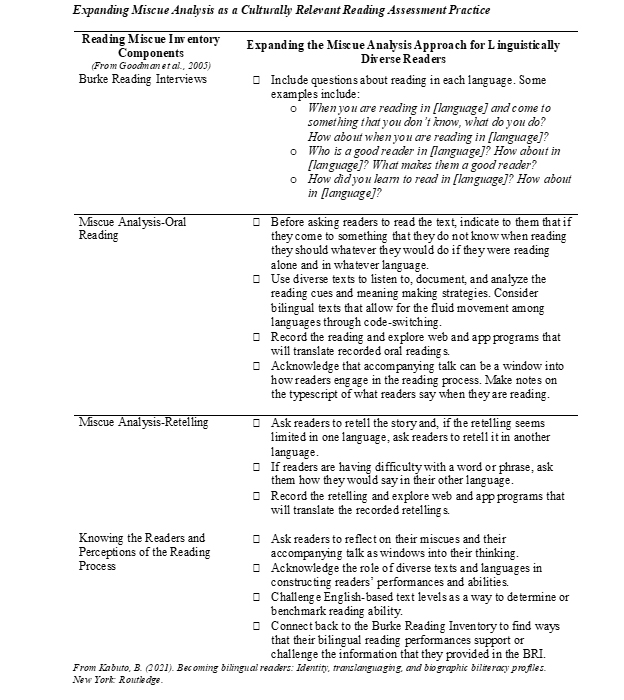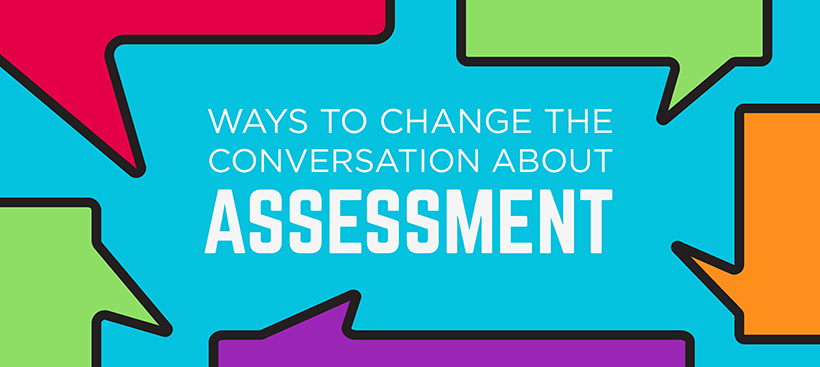This post was written by NCTE member Bobbie Kabuto, the chair of the NCTE Standing Committee on Literacy Assessment.
How can teachers advocate for what students know and can do? One way is through an inquiry perspective. An inquiry perspective means asking and answering different types of questions. Rather than asking, “What level is the reader reading on?,” we shift the question to asking, “What does the reader already know about reading?” For writing, we can ask the question, “What does the writer already know about writing?”
An inquiry perspective encourages teachers to use systematic observations to understand students as literate individuals. This perspective contrasts with a prescriptive lens to assessment, supported by standardized assessments, designed to prescribe labels around below-, above-, or at-grade level abilities.
There are four pillars to taking an inquiry stance to advocate for what students know. They are:
- Understanding that assessments need to be culturally responsive to capture the range of knowledge that students bring to any assessment task.
- Recognizing the diverse ways that students express their understandings and knowledge through a variety of expressive means (writing, drawing, orally, through multiple languages and dialects) to address linguistic equity.
- Acknowledging funds of knowledge in students’ families and communities.
- Viewing students’ learning through multiple approaches that focus on and build from systematic observations.
The Standing Committee on Literacy Assessment demonstrated how to use an inquiry perspective in their 2021 NCTE Annual Convention Presentation “Changing the Conversation on Assessment through Advocating for What Students Know.” Committee members Idalia Nuñez Cortez, Chris Hass, Renata Love Jones, and Kathryn Mitchell Pierce discussed a reading sample from a third-grade reader, a writing sample from a third-grade writer, and a writing sample from a high school student.
An Example of What Assessment Looks Like When We Take an Inquiry Perspective
One way to build on the committee’s presentation is to consider culturally responsive approaches through systematic observations. In a previous blog, I described an outline for Biographic Biliteracy Profiles. These profiles are narratives that teachers use to document the learning biographies of linguistically diverse students. Biliteracy Profiles are made up of observations (what students do) and interviews (what students say) about themselves as readers and their reading.
I use the Reading Miscue Inventory (RMI) to understand readers’ reading behaviors through documenting and analyzing their miscues and retellings. Miscues are defined as produced reading responses to text that differ from the expected response. The table below outlines how RMI can be adapted to a translanguaging context to advocate for linguistic equity. The adaptions are designed around taking an inquiry approach through a culturally responsive assessment framework that does the following:
- Develops a mindset on the importance of cultural and linguistic relevance of the assessment task.
- Acknowledges connections among race, language, and identity.
- Recognizes that feedback should be thoughtful so as not to perpetuate linguistic biases we bring to the assessment task.

An example of how RMI can serve as a culturally responsive assessment is Jenny’s retelling of Jack y Los Frijoles Mágicos [Jack and the Beanstalk]. Jenny was a second-grade student in a dual-language school in New York. After reading Jack y Los Frijoles Mágicos, Jenny began her retelling in English because she was asked in English, “What was the story about?” The retelling can be found here.
Based on the retelling transcript, Jenny was able to demonstrate her comprehension within a translanguaging context because:
- the retelling was not limited to one language; she was encouraged to use English and Spanish.
- Jenny was encouraged to use her range of linguistic resources when she needed to express certain words or phrases.
Instead of associating the word assessment with terms like accountability and high stakes testing, reframing of the word assessment should connect to terms like advocacy and equity. I leave readers with some lingering questions as you begin to reframe assessment as advocacy:
- What does culturally response assessment practices mean to you? How can you capture the range of knowledge that students bring to any literacy task?
- How do you recognize the diverse ways that students express their understandings and knowledge through a variety of expressive means (writing, drawing, orally, through multiple languages and dialects)?
- What does linguistic equity mean to you?
- How would you share students’ growth over time with family members?
- How do you view student learning through multiple approaches that focus on and build from systematic observations?
 Bobbie Kabuto is professor and chair of the Elementary and Early Childhood Education Department at Queens College, City University of New York.
Bobbie Kabuto is professor and chair of the Elementary and Early Childhood Education Department at Queens College, City University of New York.
Standing Committee on Literacy Assessment Members: Idalia Nuñez Cortez, Chris Hass, Elisa Waingort Jimenez, Renata Love Jones, Bobbie Kabuto, Kathryn Mitchell Pierce, Melissa McMullen, Peggy O’Neill, and Eric Turley.
It is the policy of NCTE in all publications, including the Literacy & NCTE blog, to provide a forum for the open discussion of ideas concerning the content and the teaching of English and the language arts. Publicity accorded to any particular point of view does not imply endorsement by the Executive Committee, the Board of Directors, the staff, or the membership at large, except in announcements of policy, where such endorsement is clearly specified.

